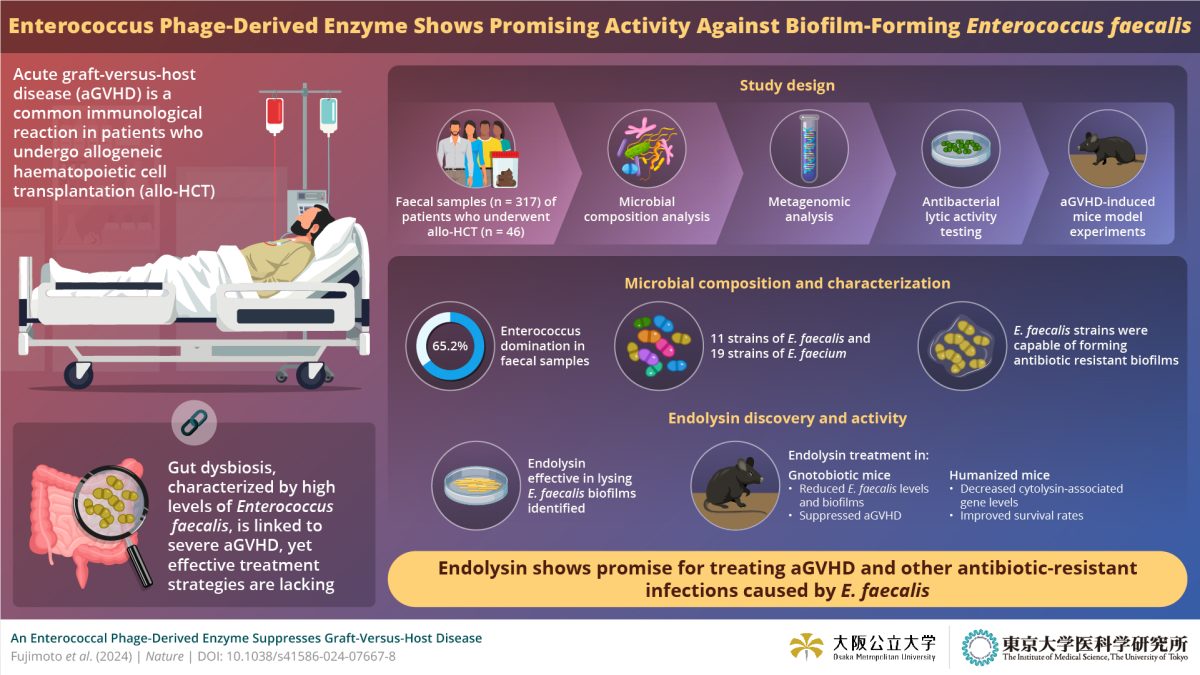Acute graft-versus-host disease (aGVHD) is a medical condition that occurs when donor immune cells attack the recipient’s tissues after an allogeneic hematopoietic stem cell transplantation (allo-HCT). The pathogenesis of aGVHD is influenced by gut dysbiosis and Enterococcus domination. Researchers from Japan recently identified a bacteriophage-derived enzyme called endolysin capable of targeting biofilms formed by Enterococcus faecalis. Their findings offer hope for tailored interventions in allo-HCT.
Allogenic haematopoietic cell transplantation (allo-HCT) involves transferring healthy donor stem cells to recipients with conditions like blood cancer, bone marrow failure, or certain genetic blood disorders. Acute graft-versus-host disease (aGVHD) is a common complication, where the donor’s immune cells attack the recipient’s tissues. Recent studies highlight the significant role of the microbiome in aGVHD, with dysbiosis contributing to its pathogenesis. Dysbiosis can lead to the emergence of pathogenic commensal bacteria including Enterococcus species, particularly E. faecalis and E. faecium, which are associated with multidrug-resistant infections in allo-HCT patients. However, there is a lack of effective therapies specifically tailored to treat dysbiosis in the context of aGVHD.
To address this gap, a multidisciplinary team led by Associate Professor Kosuke Fujimoto from Osaka Metropolitan University and The University of Tokyo, alongside Professor Seiya Imoto from The University of Tokyo, and Satoshi Uematsu from Osaka Metropolitan University and The University of Tokyo, conducted an in-depth analysis of the intestinal bacteriome of allo-HCT patients. The study aimed to investigate the prevalence and implications of Enterococcus domination in this specific patient population. Their findings, published on July 10, 2024, in the journal Nature, shed light on crucial aspects of gut microbiota dynamics in the context of allo-HCT.
Explaining the motivation behind the present research, Fujimoto says,
“During dysbiosis, some symbiotic commensal bacteria acquire pathogenic characteristics, proliferate, and become directly involved in the onset and progression of the disease. Recognizing the specificity of phage therapy and its ability to spare beneficial bacteria from adverse effects, we focused our research on phage-derived lytic enzymes.”
The team initiated their investigation by examining the intestinal microbiome of allo-HCT patients, where they noted a predominance of Enterococcus species, particularly E. faecalis. This was notably associated with acute leukemia. Despite being sensitive to several antibiotics, E. faecalis strains possessed cytolysin-associated genes, indicating high virulence. Further exploration through metagenomic analysis revealed the presence of genetic signatures associated with biofilm formation. They then proceeded with whole-genome sequencing of E. faecalis. This unveiled the presence of an intriguing bacteriophage-derived enzyme known as endolysin, exhibiting potent antibacterial activity specifically targeting E. faecalis.
Fujimoto and his team conducted rigorous in-vitro and in-vivo assays to confirm the efficacy of the endolysin. They found that it exhibited narrow-spectrum activity against E. faecalis and effectively lysed biofilms. Notably, the endolysin’s lytic activity did not affect other intestinal bacteria species. In mouse models, the efficacy of the endolysin was assessed in two experiments. Firstly, mice with induced aGVHD were treated with the endolysin, resulting in a significant reduction of E. faecalis colonization in faeces and suppression of aGVHD development. In the second experiment, mice with a gut microbiota resembling that of humans, dominated by Enterococcus bacteria, were treated with the endolysin, leading to decreased Enterococcus levels and improved survival rates.
“Bacteriophage research is gaining momentum, with advancements in phage therapy paving the way for new treatments. Our discovery of the endolysin enzyme holds promise for future applications in preventing or treating acute GVHD,” says Fujimoto, expressing his optimism regarding the potential impact and real-life applications of the research work.
Thanks to the research team for the identification of endolysin from bacteriophage, a new class of therapeutic compounds targeting highly resistant, biofilm-forming bacteria is now possible!
Check out this YouTube link for a visual explanation of the research here:

